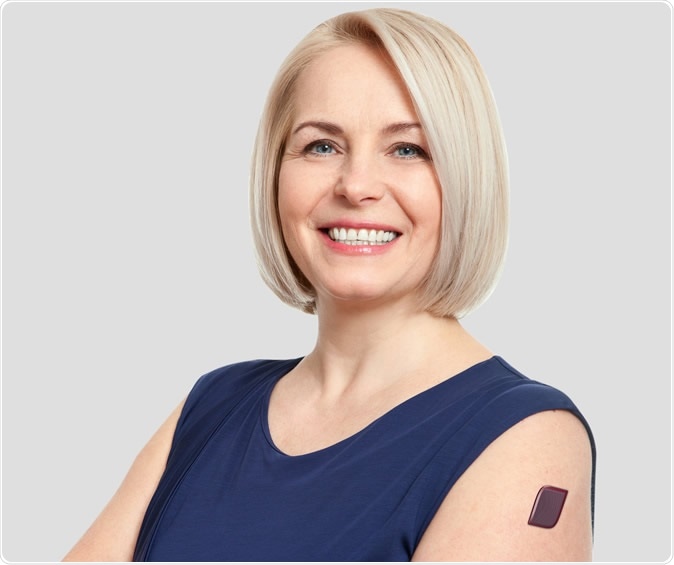An Australian start-up has come with the world's first personalized nutrition wearable device. The device measures dietary biomarkers and helps manage the risk of diseases like Type 2 diabetes.
The significance of pre-diabetes
Pre-diabetes is a condition where blood sugar is higher than usual, but not high enough for a diabetes diagnosis. It is asymptomatic and can be normalized by lifestyle changes, weight loss, and medication. Left untreated, it is a forerunner of type 2 diabetes in 70% of people within four years.
Pre-diabetes is a global phenomenon, with more than 350 million estimated to be suffering from it, and half of the population in the US and China being diabetic or pre-diabetic.
Similarly, Type 2 diabetes, which occurs when the body fails to use insulin effectively to bring down blood sugar levels, remains a growing global threat. This type of diabetes can be controlled with lifestyle, dietary, and medication changes. The smart patch is aimed at such emerging lifestyle diseases, helping people take control of their diet before it's too late.

A proof-of-concept Nutromics smart patch. Credit: RMIT
Essential dietary advice
Nutromics co-CEO Peter Vranes stated that conflicting and generic nutritional advice too often confuses people when it comes to managing diet.
"Research has shown that what we eat affects us all differently; two people might have the same meal, but their post-meal response can vary wildly," he said. "People want to make healthy food choices, but with so much conflicting nutrition advice, many of us are confused about what that looks like."
This is where the patch comes in - it measures biomarkers to tell users exactly what effect their diet had on their nutritional levels. "Being able to monitor key dietary biomarkers easily will give you the knowledge to personalize your diet to suit your own body, to get healthy, and stay healthy," Vranes says.
Specialists team up for affordable healthcare wearables
While wearable health trackers are not a new concept, with many already tracking markers like heart rate, physical activity, sleep, and more, Vranes believes the patch's strength lies in its precision.
"Current wearable technologies can track your heart rate and steps, but they can't monitor your health at a molecular level. This new technology goes deeper, targeting the precise biomarkers that drive lifestyle-related diseases like Type 2 diabetes," he explains.
The patch utilizes cutting-edge technology and support from several leading research groups, including RMIT University, Griffith University, medical device manufacturer Romar Engineering, and Innovative Manufacturing Cooperative Research Centre (IMCRC). The consortium is now involved in developing the technology needed to produce materials for the product.
Griffith University and Romar engineering will lead the fabrication of sample collection. Meanwhile, RMIT's advanced Micro Nano Research Facility will look into sensor integration and stretchable electronics fabrication. The patch would be manufactured with roll-to-roll (R2R) printing at RMIT to improve cost-efficiency.
"We've brought together a multi-disciplinary team of partners who are leaders in their fields to deliver Australian-made health technology that's personalized and powerful," Vranes said.
The pioneering technology will be designed and manufactured in Australia.
Implications for Australian medical manufacturing industry
Backed with funding from IMCRC, the project is estimated to require a total investment of $6.9 million, both cash and in-kind. Significant challenges faced will be additive manufacturing and large-scale production.
However, David Chuter, CEO and Managing Director at the IMCRC, is optimistic that the project would have long-term gains, helping to grow Australia's medical technology manufacturing segment, as well as boosting its capacity for competitive and sustainable advanced manufacturing products on a large scale.
It makes use of device fabrication skills as well as manufacturing expertise, user-friendly design for wearable sensors, and healthcare business innovation, from a well-rounded range of scientists and business people.
"The manufacturing challenges addressed by this project will not only help deliver a low-cost, high-tech smart patch but will also create technologies that are transferable to other Australian companies in the consumer and medical tech space," he said.
His thoughts were echoed by Alan Lipan, CEO of Romar Engineering. "Working with entrepreneurs, academics, and researchers to develop new medical technologies is essential to maintain Australia's international competitiveness and to build a strong domestic manufacturing skills base," he stated.
Griffith University researcher in micro- and nanotechnology, Nam-Trung Nguyen, referred to the Centre's fundamental work in microfluidics and wearable implantable microsystems as a basis for the new product.
There are many implications for the technology, including stress management, sleep health, sports performance, and early-stage viral detection, all relying on molecular-level tracking of biomarkers.
Source:
Rmit.edu.au. (2020). Personalized nutrition smart patch to be developed in Australia. Available at: https://www.rmit.edu.au/news/all-news/2020/april/smart-patch. Accessed on 28 April 2020.